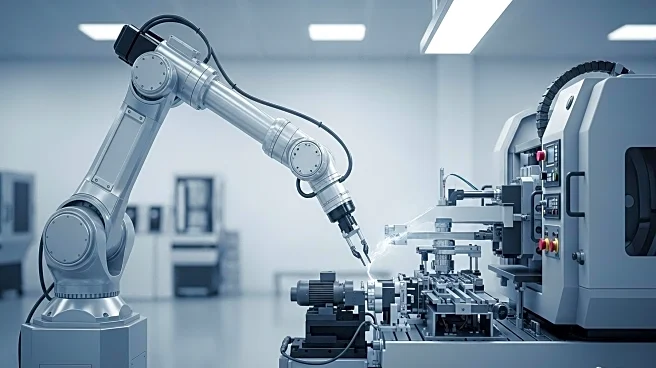What is the story about?
What's Happening?
President Trump has articulated a policy aimed at revitalizing American manufacturing by leveraging foreign expertise. In a recent statement, he emphasized the importance of foreign companies bringing skilled workers to the U.S. to transfer knowledge and train American workers. This approach is part of a broader strategy to balance foreign investment with the development of a self-sufficient manufacturing base in the U.S. The policy comes in response to a federal immigration enforcement operation at a foreign-owned battery plant in Georgia, which led to the detention of hundreds of workers, many of whom were South Korean citizens. The incident has raised diplomatic concerns and highlighted the need for a visa system that accommodates skilled foreign workers temporarily.
Why It's Important?
The policy underscores the administration's commitment to the 'America First' principle while recognizing the necessity of foreign expertise in complex industries. By facilitating knowledge transfer, the U.S. aims to regain its competitive edge in sectors like shipbuilding, which has seen a significant decline. This initiative could potentially enhance the U.S. economy by ensuring foreign investment results in tangible benefits for American workers. However, it also poses challenges in maintaining diplomatic relations, particularly with countries like South Korea, whose citizens were affected by recent immigration enforcement actions.
What's Next?
The administration is expected to refine its visa policies to better accommodate the temporary needs of foreign experts, ensuring that foreign investment does not deter due to stringent immigration enforcement. This may involve increased dialogue with international partners to address concerns and foster a conducive environment for foreign companies to invest and operate in the U.S. The focus will likely remain on ensuring that foreign investments contribute to workforce development and industrial growth.
Beyond the Headlines
The policy raises ethical and cultural questions about the balance between national interests and global cooperation. It challenges the U.S. to navigate the complexities of globalization while prioritizing domestic workforce development. Long-term, this approach could redefine the U.S.'s role in the global manufacturing landscape, potentially leading to shifts in international trade dynamics and labor market strategies.














